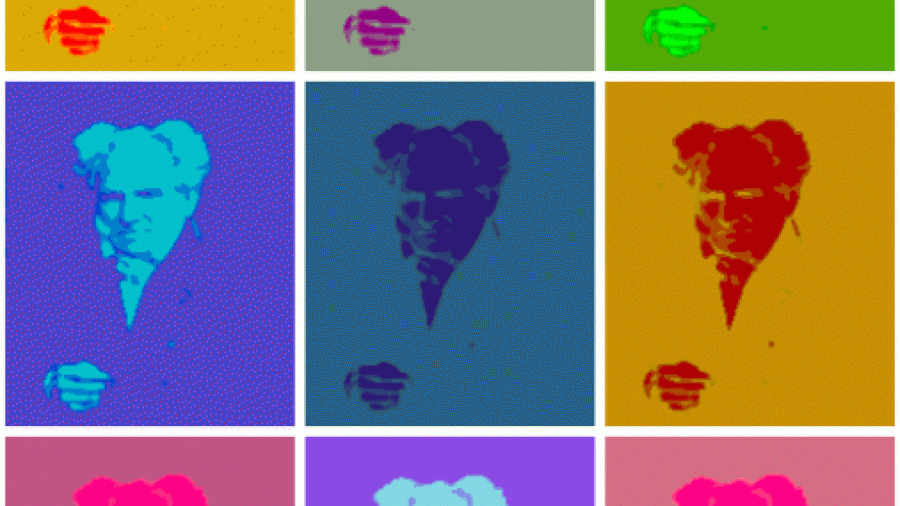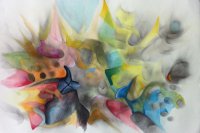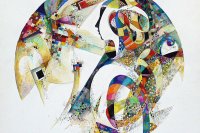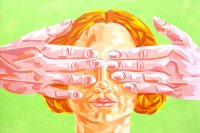“Instead of developing the child’s own faculties of discernment, and teaching it to judge and think for itself, the teacher uses all his energies to stuff its head full of the ready-made thoughts of other people.”
Arthur Schopenhauer, if you’re unfamiliar, was a 19th-century German philosopher and a rather cantankerous pessimist. He basically hated Hegel, his contemporary, whom he called a “clumsy charlatan”, and he thought that our reality was the “worst of all possible worlds”. He didn’t despise everyone, though, drawing much inspiration from Eastern philosophy and the transcendental idealism of Immanuel Kant.
Schopenhauer had a whole slew of fascinating ideas, the most famous of which was probably his notion that the metaphysical foundation of being is something called “Will”—an aimless, irrational, impersonal urge. His philosophy would ultimately influence intellectual giants ranging from this blog’s symbolic figurehead (Friedrich Nietzsche) to Albert Einstein.

Portrait of Schopenhauer by Jules Lunteschütz. Photo Credit: Wiki Commons
On Education
In his essay, On Education, Schopenhauer turns his attention toward an analysis of—you guessed it—education and dispenses some intriguing and original insights that seem worthy of consideration. He opens the essay with the following:
“The human intellect is said to be so constituted that general ideas arise by abstraction from particular observations, and therefore come after them in point of time. If this is what actually occurs, as happens in the case of a man who has to depend solely upon his own experience for what he learns — who has no teacher and no book — such a man knows quite well which of his particular observations belong to and are represented by each of his general ideas. He has a perfect acquaintance with both sides of his experience, and accordingly, he treats everything that comes in his way from a right standpoint. This might be called the natural method of education.”
So Schopenhauer opens the essay by asserting that a “natural” education is one in which a subject first experiences the world and later abstracts it into general principles. That is, a person does and sees a bunch of shit before ever trying to come up with overarching concepts of what the world is, how to act in various situations, etc. Schopenhauer contrasts this natural education with what he deems “artificial” education:
“Contrarily, the artificial method is to hear what other people say, to learn and to read, and so to get your head crammed full of general ideas before you have any sort of extended acquaintance with the world as it is, and as you may see it for yourself. You will be told that the particular observations which go to make these general ideas will come to you later on in the course of experience; but until that time arrives, you apply your general ideas wrongly, you judge men and things from a wrong standpoint, you see them in a wrong light, and treat them in a wrong way. So it is that education perverts the mind.”
The artificial method of education, for Schopenhauer, is essentially the inverse of the natural method and the method inherent in most organized systems of education. Instead of first frolicking through a prolonged experience of the world, an artificially educated subject learns, via lectures and books, an array of general ideas about the world, with the aim of later applying them to experience.
For Schopenhauer, this is a grave error. He suggests that a mind filled with abstract ideas about the world (ideas not rooted in personal experience or direct observation) will tend to try to impose its ideas onto that which it encounters, rather than allowing the worldly phenomena to pluck the cognitive harp strings in a most organic way. In other words, having too many preconceived notions about the world prevents one from simply experiencing without judging and categorizing every experience based on expectations. In preventing the latter, artificial education “perverts the mind”. Schopenhauer continues:
“This explains why it so frequently happens that, after a long course of learning and reading, we enter upon the world in our youth, partly with an artless ignorance of things, partly with wrong notions about them; so that our demeanor savors at one moment of a nervous anxiety, at another of a mistaken confidence. The reason of this is simply that our head is full of general ideas which we are now trying to turn to some use, but which we hardly ever apply rightly. This is the result of acting in direct opposition to the natural development of the mind by obtaining general ideas first, and particular observations last: it is putting the cart before the horse. Instead of developing the child’s own faculties of discernment, and teaching it to judge and think for itself, the teacher uses all his energies to stuff its head full of the ready-made thoughts of other people. The mistaken views of life, which spring from a false application of general ideas, have afterwards to be corrected by long years of experience; and it is seldom that they are wholly corrected. This is why so few men of learning are possessed of common-sense, such as is often to be met with in people who have had no instruction at all.”
For Schopenhauer, artificial education produces at once a “nervous anxiety” and “mistaken confidence”, a kind of perpetual cognitive dissonance as we attempt to cage the world within our neat-and-tidy schematic of How Things Are, rather than trying to see for ourselves. Schopenhauer advocates for an education which develops “faculties of discernment” and critical thinking skills without inculcating students’ minds with the “ready-made thoughts of other people”. I advocated something similar—an educational emphasis on free inquiry, creativity, critical thinking, and natural curiosity—in two pieces on the inadequacies of mass education and self-education.
In the duration of his essay, Schopenhauer provides more detail on how he would reform the system of education. He stresses the necessity of finding the “natural course of knowledge” upon which to base an educational model and of avoiding, until students are at least 15 years old, “instruction in subjects which may possibly be the vehicle of serious error, such as philosophy, religion, or any other branch of knowledge where it is necessary to take large views”. Before concluding the piece, he also manages to make a minor slight against women and to denounce the educational value of all but a select few works of fiction.
Problems
I’ll be the first to say that I don’t agree with everything Schopenhauer says in this essay. I flat-out reject his bias against women, for one. I also feel—as I wrote in this piece—that countless works of fiction have great potential to fracture and expand our understanding of the human experience. I do acknowledge, though, that populist novels, as with other shallow forms of media, can have the opposite effect, filling the mind with distorted, morally simplistic, and overly idealistic visions of existence.
I also feel that—if tactfully and appropriately introduced—philosophy can be taught to young-ish children. In an interview with The Atlantic, Rebecca Newberger Goldstein made a compelling case for doing just that, saying that philosophy teaches kids “to be self-critical” and “get(s) them to think about moral views”. What is key, I think, is to avoid indoctrinating children into any inflexible set of wide, sweeping beliefs on large and difficult ethical and metaphysical issues. Philosophy, if properly taught, is the opposite of dogmatic—a realm for intellectual exploration where no question has a single right answer.
Balance
These problems with Schopenhauer’s argument reside in the details, but I find his overarching premise to be striking and valuable. His primary thesis seems to be that having too many preconceived, abstract ideas about the world prevents one from learning naturally through experience, and that one’s abstract ideas should follow from and be rooted in direct experience and observation. This emphasis on the primacy of the individual’s lived experience tangentially connects Schopenhauer to certain segments of Taoism and Zen Buddhism, the phenomenologists, existentialists, Romantics, the American Transcendentalists, the Beats, and the “philosophical entertainers” Alan Watts and Terence McKenna.
I’m skeptical of whether all of one’s general ideas should be rooted in experience and observation, as Schopenhauer insists. Perhaps as many as possible. But I think such a strict litmus test for evaluating ideas discounts the valuable lenses to be found via reading in areas such as history, economics, political theory, philosophy, critical theory, and countless other fields of study wherein one might find useful frameworks for thinking that are beyond the scope of one’s direct experience. What is key, I think, is to maintain a skeptical attitude, viewing each of these sets of ideas as fallible tools—mental models that might be useful to interpret the complex phenomena of the world. So, as with so many things, I feel like there is a balance to aspire to—a perspective that is attentive to firsthand experience without being dismissive of book-learning, and vice versa.
Experiential Education
But I think Schopenhauer was correct in suggesting that, in the West, with the rise of the Ivory Tower and sanctioned bodies of “knowledge” has come a disconnect from and devaluing of the education that is to be obtained via the raw data of lived experience. And by that “education” I do not refer exclusively to what is commonly called the “school of life” or “school of hard knocks”, terms which seem roughly to mean “life lessons gained through inevitable missteps and failures”.
There are, I think, significant insights and awarenesses to be attained by attuning in real time to the nature and patterns of one’s thought processes, by focusing intensely on incoming sensory data, and/or by deliberately attempting to induce atypical forms of consciousness—aesthetic, meditative, or otherwise. In a near-future second installment of this essay, I hope to dispense more detail on several means of “learning through experience” that have proven useful, nourishing, and/or educational for me.
Note that Schopenhauer’s essay is primarily a critique of how we initiate the education of young children. If you’re keen on further pondering how we might re-think elementary education or parenting practices to reflect his views, I definitely recommend reading the rest of his essay. Though I am, in fact, interested in that angle, my follow-up to this piece will address the question of how to counterbalance the effects of “artificial education”. If you’re reading this, it’s fairly likely that you, like me, have consumed a sizable dose of book-learning in your lifetime and were introduced at a young age to some pretty rigid and comprehensive ways of thinking about this human-life-thing. That’s cool and probably great in some ways.
However, I’m fascinated by the question of how, after years of internalizing a shit-ton of general ideas about the world, we might discover new ways of learning and “knowing” that derive from direct experience, thereby perhaps remedying, to some extent, the “mistaken views of life” that Schopenhauer warns are likely to arise from the “false application of general ideas”. In the next installment, I’ll explore that question.
If this was nice, read the mission and subscribe.
About Jordan Bates
Jordan Bates is a Lover of God, healer, mentor of leaders, writer, and music maker. The best way to keep up with his work is to join nearly 7,000 people who read his Substack newsletter.





As my schooling is mainly within the natural sciences, my reflex is not to think of theoretical knowledge and real world experience as two mutually exclusive things, but rather two sides of the same coin. As a large part of my education was theoretical lectures followed up with laboratory experiments to provide real-world experience of the exact same concepts, it falls more natural for me to think of theoretical experiment and real world experience as two types of knowledge that complement and aid each others. Real world experience could even come after theoretical knowledge of the same thing: Learning is… Read more »